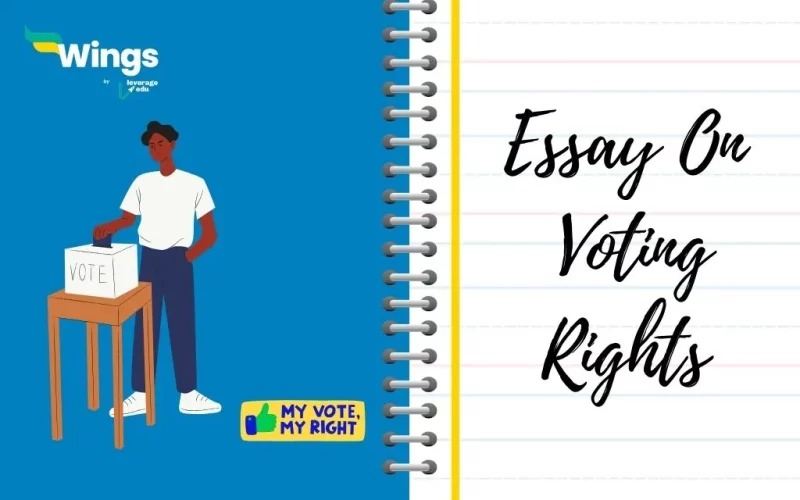Voting rights are essential to India’s democracy. They allow every Indian citizen who is 18 or older to cast their vote in their respective constituency. In India, gaining the ability to vote at the age of 18 signifies a substantial turning point in adulthood and civic duty. This guarantees that young adults will have the chance to participate in the country’s political process as adults by choosing their representatives and casting ballots for the causes they believe in. Today, we will be discussing an essay on voting rights in India. Stay tuned!
Table of Contents
Essay on Voting Rights in India in 500 Words
As the country moves towards becoming an open and participatory democracy, India’s voting rights have changed dramatically over time. Voting rights in India have a rich history that highlights democratic government and equality, from the pre-independence struggle to the introduction of universal adult franchises.
History of Voting Rights
Voting rights were a highly contentious matter before independence. Mahatma Gandhi advocated the practice of universal voting during the national freedom struggle. He, along with other nationalist leaders, saw voting as an essential civic obligation for all residents as well as a political right.
The foundation of this campaign was the belief that for India to become a genuinely democratic country, every person should be able to cast a ballot, irrespective of gender, caste, or creed.
As a direct result of their work, independent India accepted the Universal Adult Franchise (UAF). All adult Indian citizens now have the right to vote, irrespective of their social or economic status, thanks to the 1950 passage of the Indian Constitution. This action was uncommon in a post-colonial nation where extreme poverty and a dearth of knowledge were the norm.
Quick Read: One Nation One Election Essay
Universal Adult Franchise
India adopted a universal adult franchise. Every citizen, who is 18 years of age and above irrespective of their caste or education, religion, colour, race, or economic conditions, is free to vote.
India’s adoption of UAF was a landmark decision, setting it apart from many other nations. Unlike countries that restricted voting rights based on property ownership or educational qualifications, India embraced the principle of “one person, one vote” from its inception. This bold step reflected the commitment to inclusivity and empowerment of its diverse population.
Several other democracies, inspired by India’s example, also transitioned towards a universal adult franchise, recognising its inherent fairness and representation of the people’s will.
Importance of Voting Rights
The importance of voting rights in India cannot be overstated:
- Expressing Sovereignty: One of the main ways that citizens can exercise their sovereignty is through voting. Voting allows people to directly influence the policies and governance of their nation.
- Ensuring Representation: Voting promotes inclusion and social justice by guaranteeing that the government reflects the varied interests and goals of the whole population.
- Leader Accountability: Political leaders are answerable to the people through elections. The public interest is the mandate of elected politicians, who are subject to democratic processes for replacement.
- Strengthening Democracy: By encouraging civic involvement, political understanding, and a sense of duty among citizens, voting helps to reinforce the democratic fabric.
Conclusion
Voting rights have evolved in India from being a distant ideal to a vital aspect of democracy. India has developed into one of the biggest and most active democracies in the world, thanks to Gandhi’s idea of adult universal voting rights and its implementation. Voting rights are important because they affect the destiny of the country and go beyond just the act of casting a ballot. Voting rights must be preserved and improved in India as it navigates its democratic transition to create a society that is more just and equal.
Quick Read: Essay on the Role of Youth in Nation-Building
Additional Reads: Definition and Significance of Voting Rights
- Voting rights are fundamental to democracy, ensuring citizens’ participation in governance and decision-making processes.
- They empower individuals to have to say in electing representatives who will shape the policies and laws.
- Voting rights promote inclusivity by allowing every eligible adult to contribute to the democratic process.
- They are essential for holding leaders accountable and promoting transparency in governance.
- By exercising voting rights, citizens express their sovereign authority and influence the direction of their nation.
- Voting rights are a cornerstone of civil liberties, reflecting the principles of equality and political freedom.
- They enable citizens to voice their concerns, preferences, and aspirations through the ballot box.
- Voting rights have historically been championed as a means to achieve social justice and progress.
- They encourage civic engagement and political awareness among the population.
- Ultimately, voting rights empower individuals to actively participate in shaping the future of their communities.
FAQs
Ans. Election processes and complex constitutional arrangements make up electoral systems. The vote is transformed into a political decision by these elaborate voting procedures and constitutional structures.
Ans. Elections certainly contribute to limiting the authority of political leaders. This is a result of the fact that political leaders cannot afford to mistreat the public for fear of losing elections.
Ans. In India, the age of eighteen signifies the start of voting.
Popular Essay Topics for School Students
| Essay on National Voters Day | Essay on Voting |
| Essay on Labour Day | Essay on Importance of Family |
| Essay on Population Explosion | Essay on Child Labour |
| Essay on Democracy | Essay on Human Rights |
For more information on such interesting topics, visit our essay writing page and follow Leverage Edu.
 One app for all your study abroad needs
One app for all your study abroad needs













